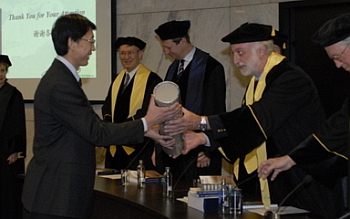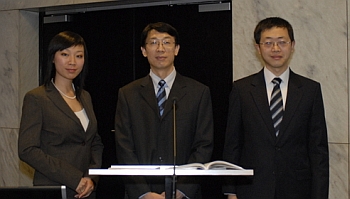Towards the Restructuring and Co-ordination Mechanisms for the Architecture of Chinese Transport Logistics
 Jaiqi Yang has defended his PhD thesis entitled “<link erim events _blank>Towards the Restructuring and Co-ordination Mechanisms for the Architecture of Chinese Transport Logistics” on January 22. This research focus on the establishment of the architecture of Chinese transport logistics (ACTL) with appropriate structure, complete functions and efficient operations, particularly on the macro environment and supporting system as well as on the fostering mechanism and monitoring model and the technique strategy of Chinese transport logistics.
Jaiqi Yang has defended his PhD thesis entitled “<link erim events _blank>Towards the Restructuring and Co-ordination Mechanisms for the Architecture of Chinese Transport Logistics” on January 22. This research focus on the establishment of the architecture of Chinese transport logistics (ACTL) with appropriate structure, complete functions and efficient operations, particularly on the macro environment and supporting system as well as on the fostering mechanism and monitoring model and the technique strategy of Chinese transport logistics.
This research has defined a foundation for systematic research into the architecture of transport logistics (ATL), in accordance with the inherent linkages and characteristics of transport and logistics. Based on a general survey of Chinese transport enterprises, this research has examined the current market situation (characterises of demand and suppliers), competition levels and trends of operations of Chinese transport enterprises together with a literature review of the related research on transport logistics in China.
For the purpose of improving the quality of more environmentally friendly modes such as water transport and rail transport that compete with haulage, which is true intermodality, appropriate policy decisions are urgently needed. To this end, this research has modelled an optimal shipping (register) policy alternative for maximizing the average performance level of Chinese transport logistics system.
His promoter is <link people hercules-haralambides _blank>Prof. dr H.E. Haralambides. Other members of the Doctoral Committee are: Prof. dr. S.L. van de Velde, Prof. dr. L. van der Berg and Prof. dr. X.P. Yan.
 About Jaiqi Yang
About Jaiqi Yang
Jaiqi Yang was born and raised in Ezhou, Hubei Province, P. R. China. He received his Bachelor of Science Degree (BSc) in Maritime Transport Management from Shanghai Maritime University in 1986. He started studying Transport Management in 1990 at Wuhan Transportation University (currently Wuhan University of Technology, WUT) and obtained his Master of Science Degree (MSc) in 1993. After one year of study at the Sweden-based World Maritime University, he received his second Master of Science Degree (MSc) in Shipping Management in 1996. Since the beginning of 2002, he has been pursuing a part-time PhD study in Maritime Economics and Logistics at Erasmus University Rotterdam in the Netherlands under the supervision of Professor H.E. Haralambides.
Since July 1986 until the present, he has worked in various capacities as an Assistant, Lecturer, Associate Professor, and Deputy Dean of College of Economics and Management at Wuhan University of Technology. He has studied as a visiting scholar at Erasmus University Rotterdam under the sponsorship of the China Scholarship Council (CSC) from September 2000 until August 2001. In addition, he has also studied on a fellowship at Antwerp University in Belgium funded by the EU Asia-Link Program from November 2006 until April 2007. His current position is as a Professor and Deputy Dean of School of Transportation at Wuhan University of Technology. He is now also a member of the Experts Panel in Soft Scientific Research appointed by the Ministry of Communications, P. R. China, a Member of the Committee of Container Transport from China’s Institute of Navigation, a member of the International Association of Maritime Economists, a special editor for the journal Port Handling, and an adviser to the editorial board of the journal of Maritime Management & Policy. His current research interests focus mainly on shipping, ports and logistics management, transport planning and management, and supply chain management.
Abstract:
With China’s emergence as a global manufacturing centre, reshaping the country’s logistics industry is assuming a global dimension too. The Chinese transport sector, despite its tremendous potential in facilitating the economic development of the country, is plagued with problems of insufficient infrastructure; overlapping regulatory authority; operational inefficiencies and a lack of logistics culture. The thesis shows that China urgently needs to restructure the architecture of its transport industry by incorporating logistics thinking and by embodying the strategic objectives of logistics development. Restructuring the architecture of transport logistics (ATL) aims to improve, the mechanism of integrated operations and planning, as well as the development of transport logistics infrastructure and facilities. Based on experiences from developed economies as a reference, and by integrating its own conditions and situation, the thesis argues that China needs to strengthen co-ordination and harmonization among the various components of its logistics system.
The architecture of transport logistics (ATL) consists of an integrated and coordinated system. The main function of the system is to accelerate interaction and coordination among transport logistics enterprises, government agencies, and relevant institutions at national level. This research presents a framework for the establishment of an efficient ATL system in China with appropriate structure, complete functions, and efficient operations. The presented framework focuses on the macroeconomic environment of transport logistics and supporting systems, presenting at the same time a monitoring and early warning system for effective pre-emptive decision making at policy level.
More Information
Pictures of the Defense
Full Text of the Dissertation


